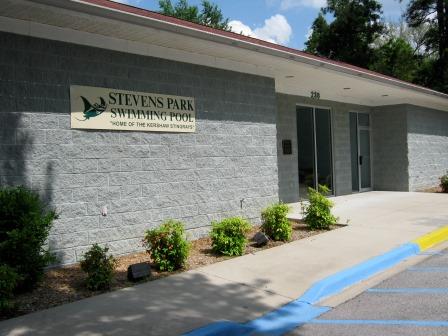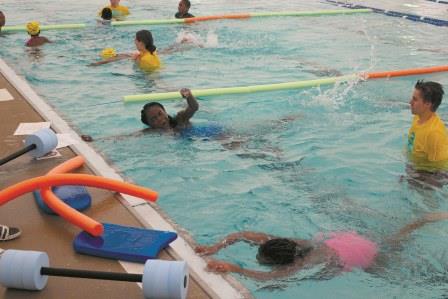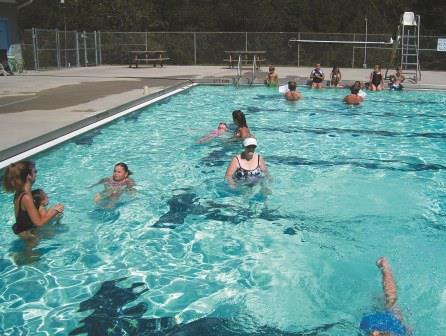For some cities and towns, it will soon be time to open up public swimming pools.

The process of opening a pool, including its licensing and construction,
can take an average of six to 15 months. Credit/Town of Kershaw
The City of Charleston has four municipal pools, of which two are open year-round and two seasonally. Charleston Councilwoman Kathleen Wilson said a municipal aquatics program offers the unique benefits of providing a competitive sport, a recreational activity and a life-saving skill. In addition, pools serve both genders, all age groups, and the entire socioeconomic spectrum, said Wilson, a marathon open water swimmer, who was the first South Carolina resident to swim the English Channel.
"Aquatics goes far beyond swimming lessons and swim teams. With creative planning and use of pool space, a municipal pool can capture a wealth of programming," said Wilson, who created and teaches SwimCalm, a program designed for adults with fear of water who wish to swim. "A quality municipal pool is also a sign of a functioning, healthy community. As our communities grow, these are the sorts of features that our residents are demanding. They often become social hubs and meeting places for regular users."
The City of Charleston Recreation Department partners with Make a Splash, the national child-focused water safety initiative of the USA Swimming Foundation. The program works with swim instructors and water safety advocates to offer swimming lessons and educate children and their families on the importance of learning how to swim.
The recreation department also offers a beginner adult course, which emphasizes water safety and self-help rescue skills. Some municipal pools also have water aerobics classes for seniors and competitive swim teams for youths.
"It is immensely gratifying to see all ages learn to swim, improve their health, refine skill sets to a high level via competition or, just as importantly, regain mobility," Wilson said.
Still, cities face liability, regulatory and financial considerations when operating pools.
"There is no doubt that pools of any size are expensive to build as well as operate and maintain," Wilson said. "Appropriate user fees and good programming decisions can make a large dent in those expenses and potentially allow the pool to break even, but the quality-of-life element is tremendous."
State oversight
Wilson, who is the head coach of the Medical University of South Carolina's Swim Club, said the S.C. Department of Health and Environmental Control imposes stringent lifeguarding regulations. She said revising lifeguarding regulations and allowing cities to determine their own level of staffing would help to control staffing costs for municipal pools.
The process of opening a pool, including its licensing and construction, can take an average of six to 15 months, according to Robert Yanity, public information officer for DHEC.
DHEC has a public swimming pool permitting section that is responsible for reviewing new public swimming pool plans. When the permitting section determines that the pool meets regulatory standards, including that a licensed pool builder will be in charge of construction, DHEC issues a construction permit.
The S.C. Department of Labor, Licensing and Regulation is responsible for certifying pool builders. Before a new pool is allowed to operate, it must pass a final DHEC inspection.
Yanity said DHEC has seen several municipalities re-open older city pools that have been closed for several seasons. Generally, these older pools didn't comply with current regulatory standards and require a lot of work before they can open, he said.
Meanwhile, splash pads have become trendy. And cities and towns have gotten in on it, opening splash pads — fountains over a draining surface that people may stand in — as an alternative to the traditional city pool. Splash pads are easier to operate, don't require lifeguards, and have a lower risk of drowning, since there is typically no standing water.
"In recent years, the Americans with Disabilities Act has changed nationally and required that pools be more accessible," Yanity said. "A splash pad doesn't have the same challenges as a typical city pool, so there is little that has to be done to comply with the more stringent federal requirements."
But while splash pads simply offer a place to cool off on a hot day, swimming pools give residents an educational, fitness and therapeutic space.
"Our South Carolina population is aging, and we are finding that the water, in addition to its calming nature, is a wonderful way to regain movement following injury or surgery," Wilson said. "On the other end of the aquatic spectrum, competition is growing rapidly among our youth and adult populations. The water is also a great cross-training option for those who stay mostly on land."
'Just to cool off'
Other towns, including Mount Pleasant and Kershaw, also maintain public pools.
The Town of Kershaw works with the J. Marion Sims Foundation and the Lancaster County School District to offer swimming lessons to second graders and fourth graders during the school year. The pool is also available for private events, such as birthday parties and church outings.
The town acquired the pool from Springs Industries in the 1990s. Town Administrator Mitch Lucas said the Lancaster County Recreation Department helps with maintenance. The town refurbished the pool 12 years ago and is planning to do so again this year.
"It is also a place where our older folks can go to get some exercise," said Lucas.
But maintaining a municipal swimming pool is not easy.
"People think we're supposed to make money," he said. "But in recreation, you're not going to make any money. The way we've done things the last few years, we lose money, but we're not losing a whole lot of money. It is a benefit for the town."
Lucas said the town offers lots of other amenities, including a bowling alley, golf course and skate park.
"To be a small town with less than 2,000 people, we have a pretty good recreation program."


